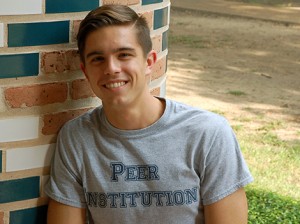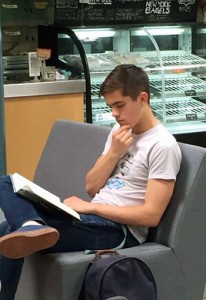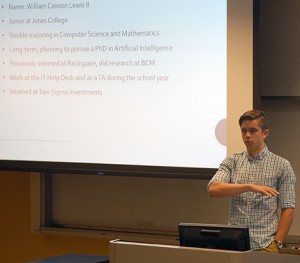 “It’s fairly strenuous, involving six hours of interviews,” said CS junior Cannon Lewis as he recounted the application process leading up to his internship offer from Two Sigma. While a Two Sigma intern, Lewis performed text data analysis for the news team in SoHo, generating financial value from different feeds of news providers.
“It’s fairly strenuous, involving six hours of interviews,” said CS junior Cannon Lewis as he recounted the application process leading up to his internship offer from Two Sigma. While a Two Sigma intern, Lewis performed text data analysis for the news team in SoHo, generating financial value from different feeds of news providers.
His work required using Natural Language Processing and different kinds of statistical analysis; he said, “Our job was to analyze these text documents and generate statistical models. I implemented different kinds of statistical analysis on this cluster that they had previously been using for storage, but that also had a compute capability that could be hacked in.”
Lewis said, “The thing that got me to apply to Two Sigma was COMP 311 last fall. The professor, Eric Allen, is a vice president at Two Sigma. He talked about what he did, the great working environment, and described the cool CS problems they were working on even though they were a finance company. He encouraged me to apply after I expressed interest.”
While in high school, Lewis spent two summer internships at Rackspace, and then he received the CPRIT (Cancer Prevention Research Institute of Texas) Fellowship to research Computational Cancer Biology at the Baylor College of Medicine the summer after his freshman year at Rice. During the academic year, he works as a teaching assistant for math and CS courses and also covers shifts on the IT Help Desk as a student computer consultant.
 Lewis’ general interest in CS can be traced back to his childhood. “I read a lot [of SciFi] when I was a kid–I still do. In a lot of ways, SciFi is an ideological touchstone, dreamed up without limitations, and then someone goes and does it.” But it was his family’s first computer that triggered his fascination with programming.
Lewis’ general interest in CS can be traced back to his childhood. “I read a lot [of SciFi] when I was a kid–I still do. In a lot of ways, SciFi is an ideological touchstone, dreamed up without limitations, and then someone goes and does it.” But it was his family’s first computer that triggered his fascination with programming.
“You have to understand–we didn’t even have a TV until I was ten,” said Lewis. “When we got a computer, I was eleven or twelve and it was crazy to me; I’d never seen one before or really used the internet. There was a game in development called 0x10c made by Notch.” Notch released a spec for the DCPU-16, a simulated computer that was not yet implemented, and fans could implement emulators of the architecture free, to gain access to the game.
Lewis said, “I was into Minecraft and started playing around with this assembly language. There was a leaderboard where you could share your programs [and download others’]. I wrote a program that allowed you to draw in the terminal of the 16-bit computer. It got downloaded about 10,000 times and I thought, ‘Oh my god, this is crazy. This thing that I wrote and built with my hands…what was in my head is out there.’ This is what got me hooked on programming–infinite possibility.”
After two years at Rice, his interests have shifted to artificial general intelligence. He said, “A lot of people are interested in building AI in specific areas–AGI is fascinating because it can apply to many different areas at once, and it’s designed to take in its surroundings and learn from it, like social interaction. That’s key in human behavior, and we can potentially capture some aspect of human intelligence with AGI.”
Lewis is double majoring in CS and Math and plans to pursue a PhD after graduation, so he strives to gain as much practical experience as possible, believing that “theory and practice are intertwining and indispensable to each other.”
He said, “There’s a temptation when you’re in school or doing research to keep climbing the ivory tower, learn one abstract thing after another…it feels like that’s where the powerful systems are.” But Lewis, ever practical, realizes his research has to be “linked to what people want, to results that are applicable and useful.”
William Canon Lewis II completed a B.S. in CS in 2018.
–Juliann Bi, Computer Science Assistant Publicist
